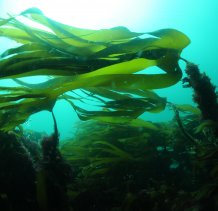Articles

Image: Kelp Forest by Eric Feunteun courtesy of RECIF
Artificial reef to be created from waste seashells
Specialists in marine resources and artificial reefs have gathered at the University of Exeter’s Environment and Sustainability Institute (ESI) on the Penryn Campus to discuss the design and creation of an innovative new marine reef in the English Channel.
The RECIF project, which brings together eight French and British partners, aims to develop innovative new ways to reuse shell waste in building materials to create artificial marine reefs. The project will see the partners, including the University of Exeter, piloting a new artificial reef design in the waters off the French coast.
Led by specialist French engineering institution, ESITC Caen (Ecole d'ingénieurs en travaux de la construction de Caen), the collaborators will use empty shells (a by-product of the fishing and seafood industry) as aggregate to create a special concrete, this is turn will be used to form the structure of an artificial reef. In undertaking the research, the team will also establish valuable new baseline ecological information about the marine environment.
Researchers from the University of Exeter, led by Dr Jens Andersen from the Camborne School of Mines (CSM), are contributing to the project by undertaking specialist mineralogical analysis of the materials used in the reef construction before and after immersion in the marine environment.
Speaking of the University team’s contribution to the project, CSM and ESI Research Fellow, Dr Eleanor van Veen said: “Specialist techniques including scanning electron microscopy will allow the team to examine the microstructure of the concrete in great detail. It will be fascinating to observe the effect of sea water on the building material, and we also hope to observe the effect of re-colonisation by marine organisms on the concrete material at this microscopic scale.”
Artificial reefs can bring many benefits including the creation of new habitats as a means of increasing the biodiversity, and the development of new diving and surfing locations which support the marine leisure industry. While this project will result in the creation of an artificial reef near the French coast, future applications of the innovative technology being established may enable the placement of additional reefs in other locations. It is hoped that the reuse of natural marine materials in their construction will create more environmentally friendly structures than current artificial reefs.
RECIF is a European Cross-border Cooperation Programme, INTERREG IV A France (Channel) - England, and is co-funded by the European Regional Development Fund (ERDF), and the Lower Normandy Region (France).
The ESI is working with businesses and enterprises across all sectors of the economy in Cornwall, the Isles of Scilly and beyond to translate research and expertise into innovative business practices, products and services in order to respond to the challenges of environmental change. It has been funded by the ERDF Convergence Programme (£22.9M) and the South West Regional Development Agency (£6.6M), with significant support from the Higher Education Funding Council for England.
Date: 27 January 2014
